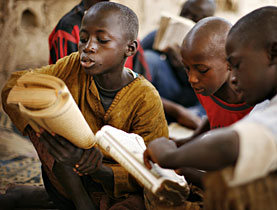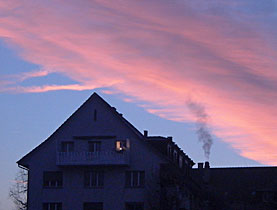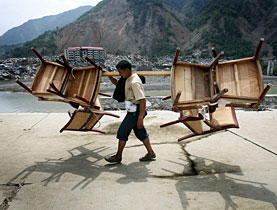Research may help future development strategy

A conference in Bern has debated how cooperation in research can help in the daily struggle of poor people to survive.
Governments and international organisations have been talking for months how to fight climate change. But at the same time the poor people of the world have another problem – survival.
A conference in the Swiss capital has asked whether research cooperation can help in this daily fight, an issue brought up at the International Conference on Research for Development in the Swiss capital.
Behind the conference was The National Centre of Competence in Research North South (NCCR), one of the key members of the Swiss National Science Foundation.
One of the main elements was that researchers from both Switzerland and from the developing world have been cooperating in such work since 2001.
“We are currently trying to draw up an interim result of our work,” commented Hans Hurni, a professor at Bern University and director of the NCCR.
“We are trying to work out what has been achieved in the fields of government competence, conflict solving, the fight against poverty and ecological sustainability,” he told swissinfo.
State of change
“At the moment, the whole issue of cooperation is in a state of change. We are considering how this can be improved. And research as such comes more and more into the forefront.”
Local ministries and non-governmental organisations cover the majority of classical development cooperation areas –building wells, planting trees and improving agriculture.
“Today we need cooperation on other fronts. At universities there are enormous differences between the north and the south. In Africa the ratio of researchers per capita is between 50 and 100 less than in Switzerland,” Hurni said.
If people from developing countries would be educated according to systems in the developed world, these academics would hardly return to their native countries, he said.
This is not the case at the NCCR. “Of the 140 people studying for a doctorate in our programme, about 80 are from the south. All of them have gone back home.”
“Short time”
Hurni says that that the key to this success is that “we take people only for a short time when the are on the verge of ending their studies.”
Their training, which is based on the problems of small farmers in developing countries, is done at home.
Can Swiss companies help in efforts to promote peace?
According to Laurent Goetschel, director of the Swiss Peace Foundation, swisspeace, there has been no action on specific projects, although talks have taken place.
He said that interest at the beginning had not been not very “overwhelming”.
However, he sees tourism as possibilities where questions can be asked, mainly regarding quality checks.
And there comes the question whether a country, for example, Myanamar, should be boycotted by tourists?
He says he is a “very curious person” and would like to go there to find out about future projects and activities. He is against a general boycott, saying these are in his view “counterproductive”.
swissinfo, based on an article in German by Jean-Michel Berthoud
The NCCR North-South is one of 20 national centres of competence in research currently supported by the Swiss National Science Foundation.
It was created on the understanding that development research and cooperation are matters of primary concern to Switzerland.
The purpose of the NCCR North-South is to create an institutional structure for sustainable development studies in Switzerland.
Additional substantial funding for research and cooperation projects in developing and transition countries is provided by the Swiss Agency for Development and Cooperation (SDC).

In compliance with the JTI standards
More: SWI swissinfo.ch certified by the Journalism Trust Initiative


You can find an overview of ongoing debates with our journalists here . Please join us!
If you want to start a conversation about a topic raised in this article or want to report factual errors, email us at english@swissinfo.ch.